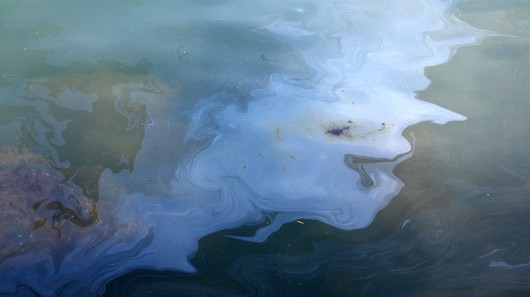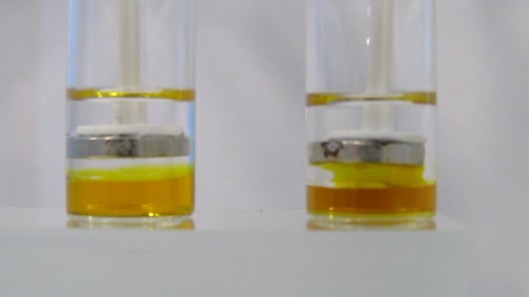
A newly-developed magnetic soap could be used to minimize the environmental impact of oil spill clean-ups (Photo: Mila Zinkova)
When oil gets spilled in a waterway, clean-up crews will often introduce a solution known as a surfactant. This is a detergent that lessens the surface tension between the water and the overlaying oil slick, causing the oil to form into individual droplets which then sink or get dispersed by wave action. Unfortunately, such detergents aren't entirely environmentally-friendly themselves, so the use of them on oil spills has been criticized as simply replacing one pollutant with another. Now, however, scientists from the University of Bristol have created a magnetic soap, that could be removed from the water once it had done its job.
The researchers started by dissolving iron in various inert surfactant materials, composed of chloride and bromide ions similar to those found in products such as mouthwash and fabric conditioner. This ultimately resulted in a soap, each particle of which possessed a metallic center.
A sample of the soap was then put in a test tube, and covered with a less dense layer of an organic solution. When a magnet was introduced from above, the soap responded by breaking the surface tension between it and the organic solution, rising through that solution to reach the magnet.
Not only could the soap conceivably be easily removed from post oil-spill environments, but its properties - such as electrical conductivity, melting point, and water solubility - could be altered back and forth simply by applying or removing a magnetic field. In traditional soaps, such properties can only be changed one time, using electricity or by altering the pH, temperature or pressure of the environment.
"As most magnets are metals, from a purely scientific point of view these ionic liquid surfactants are highly unusual, making them a particularly interesting discovery," said U Bristol's Professor Julian Eastoe, who led the research. "From a commercial point of view, though these exact liquids aren't yet ready to appear in any household product, by proving that magnetic soaps can be developed, future work can reproduce the same phenomenon in more commercially viable liquids for a range of applications from water treatment to industrial cleaning products."
Copyright © gizmag 2003 - 2011 To subscribe or visit go to: http://www.gizmag.com
